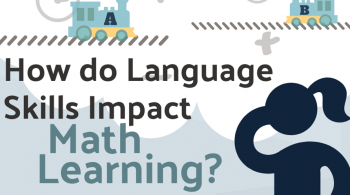By Leena Mohapatra, Ph.D.
May 3, 2016
Dr. Leena Mohapatra, Ph.D., is a pediatric neuropsychologist in the Department of Neuropsychology. Her clinical and research interest are in the evaluation of children and adults with genetic and congenital disorders, specifically Down syndrome and muscular dystrophies.
What is an Intellectual Disability?
An intellectual disability is defined as a disorder with an onset during an individual’s developmental period (typically childhood through adolescence) and results in deficits in both intellectual and adaptive functioning (e.g., independent living). The diagnosis of intellectual disability (ID) is not new and replaced what was previously known as mental retardation (MR). The stigma and negative associations made of people with mental retardation led to the changing of the term both diagnostically and legally in 2010.
How do we diagnose an intellectual disability?
The diagnosis of an intellectual disability requires the following criteria to be met:
- Deficits in intellectual functioning.
- Deficits in adaptive functioning that result in an individual’s inability to meet developmental and sociocultural standards for personal independence and social responsibility.
- An onset during the developmental period. This is typically defined as occurring during childhood; however, it may not be diagnosed accurately until later. An intellectual disability is not something diagnosed if the onset occurred as an adult.
Although Criteria C does not require direct assessment, both Criteria A and B are assessed through a formal evaluation. Intellectual functioning is often assessed with the use of individualized, standardized measures of intelligence. These measures typically assess reasoning, problem-solving, planning, abstract thinking, judgment, learning from instruction, and practical understanding. Although there is not an intelligence quotient (IQ) score that determines the diagnosis of an intellectual disability, it is typically thought that individuals with an intellectual disability fall at or below the range of 65-75. Since IQ scores are considered approximations of conceptual functioning, this alone may not provide information about how one functions in real life, and it is important that many factors be considered in the interpretation of an individual’s IQ scores.
Adaptive functioning, or one’s ability to meet community standards of personal independence and social responsibility, helps to determine the level of impairment one experiences in daily functioning. There are three domains that characterize adaptive functioning and include conceptual (academic), social, and practical (e.g., personal care, self-management of behavior, money management, recreation, etc.). Adaptive functioning is often assessed through the use of individualized, culturally appropriate, and psychometrically sound measures and clinical evaluation. Oftentimes, individuals who are knowledgeable informants (e.g., teachers and caregivers) are asked to report on a child, adolescent, or young adult’s adaptive abilities.
Compared to the previous diagnostic criteria, the severity of an intellectual disability is determined by the level of adaptive impairments rather than an IQ score. The diagnosis of an intellectual disability falls along a continuum and is described based on the level of severity: mild, moderate, severe, and profound.
What causes an Intellectual Disability?
It is estimated that approximately 1% of the population has a diagnosis of an intellectual disability. There are a number of factors including certain genetic disorders, brain malformations, exposure to drugs or noxious substances in utero (e.g., alcohol), brain injury, seizures, and metabolic disorders that can lead to a diagnosis of an intellectual disability. Despite a number of potential causes, oftentimes the cause of an intellectual disability is unidentified.
What does a child with an intellectual disability look like?
Children and adults with an intellectual disability do not “look” a certain way. Intellectual disabilities are often identified in certain genetic disorders (e.g., Down syndrome); however, this does not imply that all individuals with a physical manifestation of a disorder (e.g., Cerebral Palsy) also have an intellectual disability.
When will an individual with an intellectual disability “catch-up?”
Individuals with an intellectual disability often acquire and learn information at a slower rate than their peers. Children with an intellectual disability, particularly a mild intellectual disability, may keep pace with peers academically until the second or third grade. However, as the demands on reasoning and problem-solving increase, the gap in learning increases as well. Although individuals with an intellectual disability may not “catch-up” to their peers, they will continue to learn and acquire new information and therefore require strong supports in place to help accomplish their goals.
So if an intellectual disability is considered a slower pace of learning, then why is it not called a learning disability?
There is often confusion regarding the difference between a learning and intellectual disability. Children with a learning disability often have select deficits with learning in specific academic domains (e.g., reading, math, and writing). These children demonstrate stronger performance on IQ measures than children with an intellectual disability. The long-term implications may be different for an individual with a learning disability versus an intellectual disability as well. Individuals with a learning disability do not often have the same level of adaptive impairments (e.g., difficulty with day-to-day self-care, ability to cook with large appliances, use of transportation to help get from one place to another) as someone with an intellectual disability. These adaptive impairments often lead individuals with an intellectual disability to require long-term supports, where this is not the same for someone with a learning disability.
Can an intellectual disability be caused by other disorders, like Attention Deficit Hyperactivity Disorder (ADHD) or language difficulties?
Although ADHD and language disorders do not cause an intellectual disability, it is important to consider these factors when diagnosing a child with an intellectual disability. Difficulties with attention and language comprehension and production are often seen in children and adults with an intellectual disability.However, if attention difficulties are significant even when a child is placed within a structured learning environment, they may meet criteria for ADHD as well. Language is often considered when making the diagnosis of an intellectual disability. Specifically, it is important to consider if a child’s overall cognitive limitations are due to difficulties accessing language, only. This why IQ scores alone do not determine if a child has an intellectual disability.
What school placement helps individuals with an intellectual disability learn?
A diagnosis should not determine a child’s learning environment. Children diagnosed with an intellectual disability can benefit from placement in the general education setting, provided the appropriate supports are in place to support adaptive and language development; however, school placement depends on many factors that should be carefully considered in concert with school planning.
Resources:
- American Association on Intellectual and Developmental Disabilities. (2010). Intellectual disability: definition, classification, and systems of supports (11th ed.) Washington, D.C.: American Association on Intellectual and Developmental Disabilities.
- American Psychiatric Association. (2013). Diagnostic and statistical manual of mental disorders: DSM-5. Washington, D.C: American Psychiatric Association.















